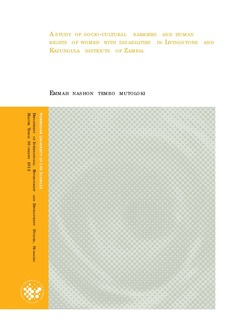| dc.description.abstract | Zambia is a signatory to the United Nations Convention on the Rights of People with
Disabilities (UNCRPD) and as such is expected to provide for people with disabilities. There are at present very few reports on the status of the lives and welfare of people with disabilities
in Zambia. The purpose of this study was to identify the socio-cultural barriers that women living with disabilities in Kazungula and Livingstone districts experience in order to enjoy a full social life, placing emphasis on the status of their human rights. The CBR approach was used since it is a WHO approved method of rehabilitating and integrating people with disabilities into society. Livingstone and Kazungula districts were chosen as study areas to represent urban and rural areas. The study was performed qualitatively, and the data was collected through observations as well as individual interviews and focus group discussions. Barriers preventing women with disabilities from enjoying full social lives in these areas were physical, such as the lack of aids for the blind, interpreters or translators for the deaf, infrastructure to facilitate movement or access to buildings for the physically handicapped. In
addition, poverty, dependence and negative attitudes were also identified as barriers. Poor education meant that the women could not compete favorably for formal employment and this
made them unable to provide for their families especially that they did not receive any form of financial support from the government. On the cultural influence on families and relationship, the women in Kazungula were of the opinion that this was a significant barrier to social inclusion while their Livingstone counterparts responded otherwise. The respondents in Livingstone also had a much better knowledge of human rights and UNCRPD, than those in Kazungula who almost had no idea. In both districts, the responded felt that government was not doing enough to provide for them or to protect their human rights. The findings of this study suggest that women with disabilities in rural areas are at more disadvantaged than those in urban areas and therefore interventions should take into account this fact. The strongest basis for the barriers observed in this study was negative attitudes. In order to remove barriers, awareness campaigns aimed at changing people’s attitudes towards women with disabilities will be important. Secondly, having a job was found to be positively related to a satisfactory life style for the women with disabilities yet their educational backgrounds disadvantaged them from acquiring employment. Introduction of programs that
empower the women and encourage them to be self-reliant will be essential in removing some of the barriers faced by these women. Finally, CBR has the potential of turning things around because it’s social strategies allow different players to enter and offer different forms of support to the same community. This is important as it does not over-stretch the resources of one organization while maximizing the overall results. | no_NO |
